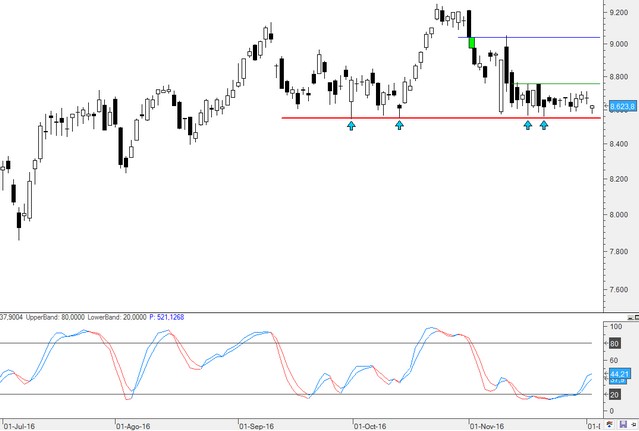- Banco Popular falls 4% after surging 13% on Thursday
- Oil prolongs its rally and barges its way towards $54

The Ibex 35 has closed the week with losses of 0.72% to 8,607.10 points. The weekly loss is almost the same as the previous week's, and has maintained its range of between 8,600 and 8,700.
- 0,317€
- 0,00%
- 0,091€
- 0,00%
- 11.467,300
- 0,24%
The Spanish index, much like the rest of the European markets, is completely focused on the Italian referendum, in which not only rests the future of Italy but also the prospects of its European neighbours. The growth of populism is now becoming one of the principal concerns of investors and a "no" to Matteo Renzi's constitutional reforms would open the door to these type of movements.
In any case, JPMorgan Chase analysts recommend taking advantage of the losses that would come if a "no" vote was successful, as in its opinion, the European Central Bank would contain the cutbacks.
In the business realm, the attention in Spain turned to Banco Popular, after deciding to replace Angel Ron as president following a rough period. His replacement will be Emilio Saracho, an investment banker who promises to return the trust of the markets to the bank. The banks stocks were the biggest fallers on Friday by 4.5% to 0.897 euros.
Other shares which dropped on Friday were Melia Hotels, Grifols, Gamesa and Bankia, all with losses of 2%. Among the winning stocks were Tecnicas Ruidas which gained 2.5% and Gas Natural which rose 1%. In the big companies, Telefonica dropped 1% and has gallen almost 15% from the maximums of November. Repsol, BBVA and Santander also fell by 1%.
In the oil market, Brent crude continued its escalation after the OPEC agreement to cut production levels of the commodity. Crude rose 15% in three sessions and is now at $53 per barrel.
Returning to Spain, the unemployment level in public services rose in November by 24,841 in comparison with the previous month (+0.6%), to a total of 3,789,823. The level continues its fourth monthly rise after the reports of August, September and October, and is the worst November since 2012.
However, the Spanish government today predicted that Spain will once again have 20 million people working in 2019 and that the rate of unemployment will be at 12.8%. In addition, the executive has passed a law with the support of the PSOE, which will see a rise in the minimum monthly wage by 8%, to 707.60 euros. It is the biggest raise of the level in 30 years.
The other major news of the day was the US jobs report for November, in which the unemployment rate dropped to 4.6% from 4.9% in October. It is the lowest levels seen in the country since 2007, before the financial crisis. The data reaffirms the belief of many that the Federal Reserve will raise interest rates in its December meeting on December 14.
Bolsamanía analyst José María Rodríguez said that the Ibex was likely to experience strong volatility when it comes out of this calm period. "Normally, in these type of situations the result is a strong break, a violent one."
"What we really are looking at is the reaction of the markets to the next movement of the Spanish index," he added.


